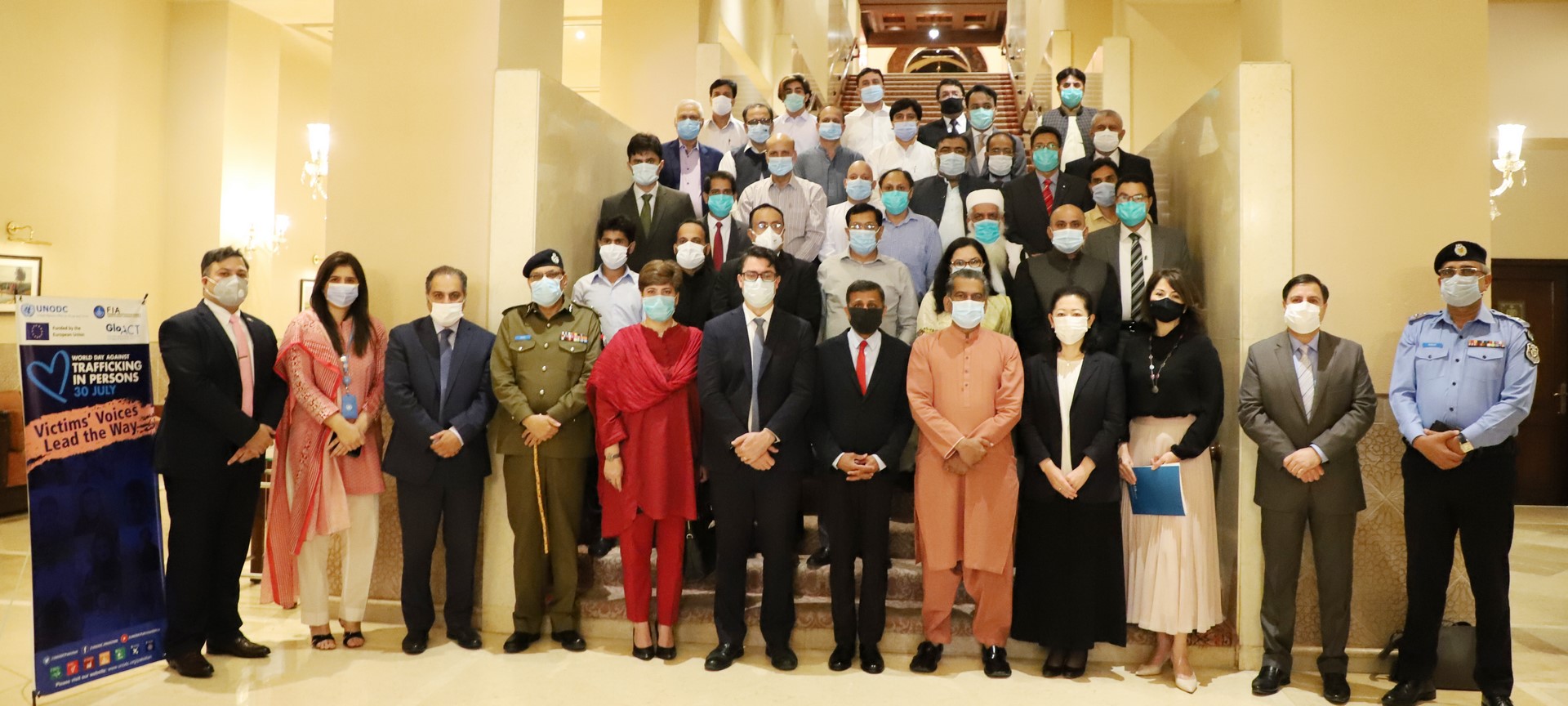ISLAMABAD: Under the EU funded Global Action to Address Trafficking in Persons and the Smuggling of Migrants (GLO.ACT – Asia and the Middle East), the United Nations Office on Drugs and Crime (UNODC), commemorated World Day against Trafficking in Persons (TIP) in collaboration with the Federal Investigation Agency during a seminar held on Friday.
“Victim’s Voices Lead the Way” is this year’s World Day against TIP theme. It’s a theme that puts victims of human trafficking at the centre and highlights the importance of listening to and learning from survivors of human trafficking and the crucial role they play in establishing effective measures to prevent this crime, identify and rescue victims and support them on their road to rehabilitation.
During the commemoration seminar, key messages from survivors of trafficking and other relevant stakeholders were highlighted. The event also presented the National Action Plan to combat human trafficking and migrant smuggling (2021-2025) adopted by the Government which provides a comprehensive coordination framework for all stakeholders tasked with addressing Trafficking in Persons.
During his welcome remarks, Dr. Jeremy Milsom, Representative UNODC Country Office Pakistan said that, “The United Nations Office on Drugs and Crime is committed to advancing action to bring traffickers to justice while protecting and supporting their victims. The rights of victims must come first – be they the victims of traffickers, smugglers, or of modern forms of slavery or exploitation”.
He further said that: “Almost every country has national human trafficking laws, yet people continue to be trafficked – most of them, women, and girls. We welcome the progress made by Pakistan, in particular the Federal Investigation Agency, in tackling human trafficking, through implementing the Prevention of Trafficking in Persons Act 2018 and its rules, and the National Action Plan to combat human trafficking and migrants smuggling (2021-2025)”.
The Director General FIA, Sanaullah Abbasi, during his speech said that: “FIA and UNODC have been partners for more than a decade to curb human trafficking and migrants smuggling. Through this partnership we have achieved many goals including the enactment of laws on TIP and Smuggling of Migrants in 2018. The partnership will further help FIA to build its capacity to fight the menace of human trafficking”.
The seminar was attended by the senior representatives of FIA, UNODC, the European Union, Provincial Social Welfare and Labour departments, provincial police, representatives from federal ministries including the Ministry of Interior, Ministry of Overseas Pakistanis and Human Resource Development and ICMPD.
The Global Action against Trafficking in Persons and the Smuggling of Migrants – Asia and the Middle East (GLO.ACT-Asia and the Middle East) is a four-year (2018-2022), €12 million joint initiative by the European Union (EU) and the United Nations Office on Drugs
and Crime (UNODC) being implemented in partnership with the International Organization for Migration (IOM) in up to five countries: Islamic Republic of Afghanistan (Afghanistan), Islamic Republic of Iran (I.R. of Iran), Republic of Iraq (Iraq), Islamic Republic of Pakistan (Pakistan). GLO.ACT-Bangladesh is a parallel initiative also financed by the EU and implemented with IOM.
The project builds on a global community of practice set in motion in GLO.ACT 2015-2019 and assists governmental authorities and civil society organizations in targeted, innovative, and demand-driven interventions: sustaining effective strategy and policy development, legislative review and harmonization, capability development, and regional and trans-regional cooperation. The project also provides direct assistance to victims of human trafficking and vulnerable migrants through the strengthening of identification, referral, and protection mechanisms. The project is fully committed to mainstreaming Human Rights and Gender Equality considerations across all of its activities.












